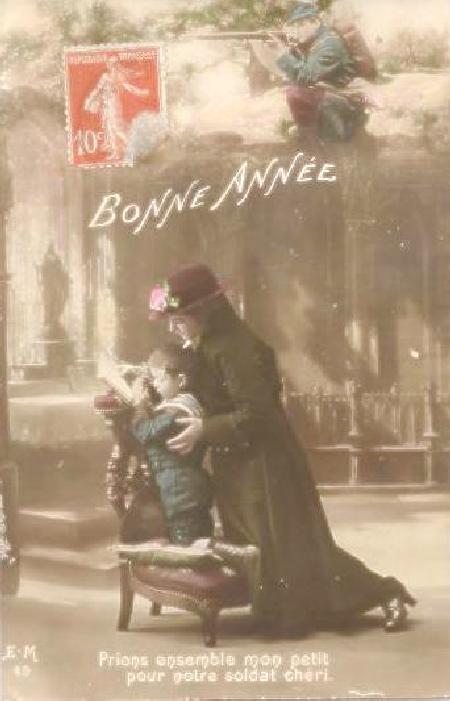
French Post Cards: World War I

Figure 1.--This post card was mailed in France during Jabuary 1915. It was a New Yers card. At the bottom it reads, "Prions ensemble mon petit pour notre soldat chéri." That means "Let's pray together my little for our beloved soldier." This card was used for a family letter.
|
Post cards in the early 20th century werea popular way of keeing in touch. Mail service in major European countries was quite good. Often mail was delivered twice a day. Greeting cards were not as common as thy are today, but written communications were much more common. Few families had telephones. And long distant calls were very rare and expensive. Thus when the War began, post cards were commonly used for quick notes by soldiers at the front, sometimes hard pressed to write a long letter. They also continued to be used by civilians. The same thems produced before the War were produced during the War. Many new patriotic cards were added, but not cenes showing battiefield carnage.
Usage
Post cards in the early 20th century werea popular way of keeing in touch. Mail service in major European countries was quite good. Often mail was delivered twice a day. Greeting cards were not as common as thy are today, but written communications were much more common. Few families had telephones. And long distant calls were very rare and expensive.
Thus when the War began, post cards were commonly used for quick notes by soldiers at the front, sometimes hard pressed to write a long letter. The letters and cards that the men who manned the World War I trenches are heart breaking. As HBC focuses heavily
on photography and other visual images, we are especially struck by both the postcards selected by the British Tommies and the messages on the back. We note that the British
Tommies in France and Belgium selected sentinental French post cards to send home. Some of the cards were of inniocent children with sentimental messages. They surely
myst have reminded them of their children back home in England. Some of the cards had to pass through the censors. We do not know at this time how this affected the messages
penned.
Civilians
They also continued to be used by civilians. vacations because of the War were less common. Most cards sent by civlians to each other were simple communications between friends and family. Cards for holidays such as Christmas and News Years were common. The one shown on this page reads, "C'est avec un grand plaisir que nous avons reçu ta carte, nous aussi à notre tour nous te souhaitons une bonne et heureuse année, ainsi que ton papa, ta maman et ton frère Joseph. Tu me dis que ton frère Joseph se rappelle de Julien; il se rappelle aussi, il n'a oublié aucuns de vous, ainsi que le
petit à Joseph qui marchait tout seul. Bien le bonjour à papa, à maman pour nous. Julien est toujours méchant. Allons au revoir cousine. Ton cousin qui t'embrasse de tout coeur.
That means something like, "It is with a great pleasure that we received your card, we also in our turn wish you good and happy year, from your dad, your mom, and your brother Joseph. You tell me that your Joseph brother remembers Julien. He remembers also, he did not forget abuut you, as well as the small one in Joseph who walked all alone. Well the hello to dad, mom for us. Julien is always malicious. Let us go goodbye cousin. Your cousin who kisses with her heart. "
Images
The same thems produced before the War were produced during the War. Many new patriotic cards were added, but not cenes showing battiefield carnage.
Christopher Wagner

Navigate the Boys' Historical Clothing Web Site:
[Return to Main French post card page]
[Return to Main military style page]
[Introduction]
[Activities]
[Biographies]
[Chronology]
[Clothing styles]
[Countries]
[Bibliographies]
[Contributions]
[Essays]
[FAQs]
[Glossaries]
[Satellites]
[Tools]
[Boys' Clothing Home]
Created: January 17, 2003
Last updated: January 17, 2003



